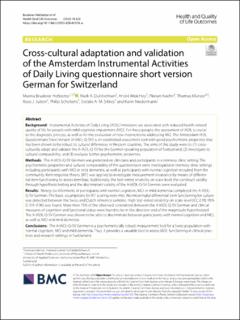Please use this identifier to cite or link to this item:
https://doi.org/10.21256/zhaw-21206| Publication type: | Article in scientific journal |
| Type of review: | Peer review (publication) |
| Title: | Cross-cultural adaptation and validation of the Amsterdam Instrumental Activities of Daily Living questionnaire short version German for Switzerland |
| Authors: | Bruderer-Hofstetter, Marina Dubbelman, Mark A. Meichtry, André Koehn, Florian Münzer, Thomas Jutten, Roos J. Scheltens, Philip Sikkes, Sietske A. M. Niedermann Schneider, Karin |
| et. al: | No |
| DOI: | 10.1186/s12955-020-01576-w 10.21256/zhaw-21206 |
| Published in: | Health and Quality of Life Outcomes |
| Volume(Issue): | 18 |
| Issue: | 323 |
| Issue Date: | Oct-2020 |
| Publisher / Ed. Institution: | BioMed Central |
| ISSN: | 1477-7525 |
| Language: | English |
| Subjects: | Amsterdam IADL questionnaire; Assessment; Cross-cultural validation; Elderly people; Instrumental Activities of Daily Living (IADL); Mild cognitive impairment (MCI); Mild dementia; Aged; Aged, 80 and over; Case-Control Studie; Cognitive dysfunction; Cross-cultural comparison; Dementia; Female; Human; Male; Middle aged; Psychometrics; Reproducibility of results; Retrospective study; Survey and questionnaire; Switzerland; Translation; Activity of daily living; Quality of life |
| Subject (DDC): | 616.8: Neurology, diseases of nervous system |
| Abstract: | Background Instrumental Activities of Daily Living (IADL) limitations are associated with reduced health-related quality of life for people with mild cognitive impairment (MCI). For these people, the assessment of IADL is crucial to the diagnostic process, as well as for the evaluation of new interventions addressing MCI. The Amsterdam IADL Questionnaire Short Version (A-IADL-Q-SV) is an established assessment tool with good psychometric properties that has been shown to be robust to cultural differences in Western countries. The aims of this study were to: (1) cross-culturally adapt and validate the A-IADL-Q-SV for the German-speaking population of Switzerland; (2) investigate its cultural comparability; and (3) evaluate further psychometric properties. Methods The A-IADL-Q-SV German was pretested on clinicians and participants in a memory clinic setting. The psychometric properties and cultural comparability of the questionnaire were investigated in memory clinic settings including participants with MCI or mild dementia, as well as participants with normal cognition recruited from the community. Item response theory (IRT) was applied to investigate measurement invariance by means of differential item functioning to assess item bias. Additionally, the test–retest reliability on scale level, the construct validity through hypothesis testing and the discriminant validity of the A-IADL-Q-SV German were evaluated. Results Ninety-six informants of participants with normal cognition, MCI or mild dementia completed the A-IADL-Q-SV German. The basic assumptions for IRT scoring were met. No meaningful differential item functioning for culture was detected between the Swiss and Dutch reference samples. High test–retest reliability on scale level (ICC 0.93; 95% CI 0.9–0.96) was found. More than 75% of the observed correlations between the A-IADL-Q-SV German and clinical measures of cognition and functional status were found to be in the direction and of the magnitude hypothesized. The A-IADL-Q-SV German was shown to be able to discriminate between participants with normal cognition and MCI, as well as MCI and mild dementia. Conclusions The A-IADL-Q-SV German is a psychometrically robust measurement tool for a Swiss population with normal cognition, MCI and mild dementia. Thus, it provides a valuable tool to assess IADL functioning in clinical practices and research settings in Switzerland. |
| URI: | https://digitalcollection.zhaw.ch/handle/11475/21206 |
| Fulltext version: | Published version |
| License (according to publishing contract): | CC BY 4.0: Attribution 4.0 International |
| Departement: | School of Health Sciences |
| Organisational Unit: | Institute of Physiotherapy (IPT) |
| Published as part of the ZHAW project: | Test der Deutschen Version des Amsterdam-IADL-Fragebogens® bei Personen ohne und mit leichter Hirnleistungsschwäche |
| Appears in collections: | Publikationen Gesundheit |
Files in This Item:
| File | Description | Size | Format | |
|---|---|---|---|---|
| 2020_Bruderer-Hofstetter-etal_Cross-cultural-adaptation-validation-A-IADL-Q-SV.pdf | 1.29 MB | Adobe PDF |  View/Open |
Show full item record
Bruderer-Hofstetter, M., Dubbelman, M. A., Meichtry, A., Koehn, F., Münzer, T., Jutten, R. J., Scheltens, P., Sikkes, S. A. M., & Niedermann Schneider, K. (2020). Cross-cultural adaptation and validation of the Amsterdam Instrumental Activities of Daily Living questionnaire short version German for Switzerland. Health and Quality of Life Outcomes, 18(323). https://doi.org/10.1186/s12955-020-01576-w
Bruderer-Hofstetter, M. et al. (2020) ‘Cross-cultural adaptation and validation of the Amsterdam Instrumental Activities of Daily Living questionnaire short version German for Switzerland’, Health and Quality of Life Outcomes, 18(323). Available at: https://doi.org/10.1186/s12955-020-01576-w.
M. Bruderer-Hofstetter et al., “Cross-cultural adaptation and validation of the Amsterdam Instrumental Activities of Daily Living questionnaire short version German for Switzerland,” Health and Quality of Life Outcomes, vol. 18, no. 323, Oct. 2020, doi: 10.1186/s12955-020-01576-w.
BRUDERER-HOFSTETTER, Marina, Mark A. DUBBELMAN, André MEICHTRY, Florian KOEHN, Thomas MÜNZER, Roos J. JUTTEN, Philip SCHELTENS, Sietske A. M. SIKKES und Karin NIEDERMANN SCHNEIDER, 2020. Cross-cultural adaptation and validation of the Amsterdam Instrumental Activities of Daily Living questionnaire short version German for Switzerland. Health and Quality of Life Outcomes. Oktober 2020. Bd. 18, Nr. 323. DOI 10.1186/s12955-020-01576-w
Bruderer-Hofstetter, Marina, Mark A. Dubbelman, André Meichtry, Florian Koehn, Thomas Münzer, Roos J. Jutten, Philip Scheltens, Sietske A. M. Sikkes, and Karin Niedermann Schneider. 2020. “Cross-Cultural Adaptation and Validation of the Amsterdam Instrumental Activities of Daily Living Questionnaire Short Version German for Switzerland.” Health and Quality of Life Outcomes 18 (323). https://doi.org/10.1186/s12955-020-01576-w.
Bruderer-Hofstetter, Marina, et al. “Cross-Cultural Adaptation and Validation of the Amsterdam Instrumental Activities of Daily Living Questionnaire Short Version German for Switzerland.” Health and Quality of Life Outcomes, vol. 18, no. 323, Oct. 2020, https://doi.org/10.1186/s12955-020-01576-w.
Items in DSpace are protected by copyright, with all rights reserved, unless otherwise indicated.